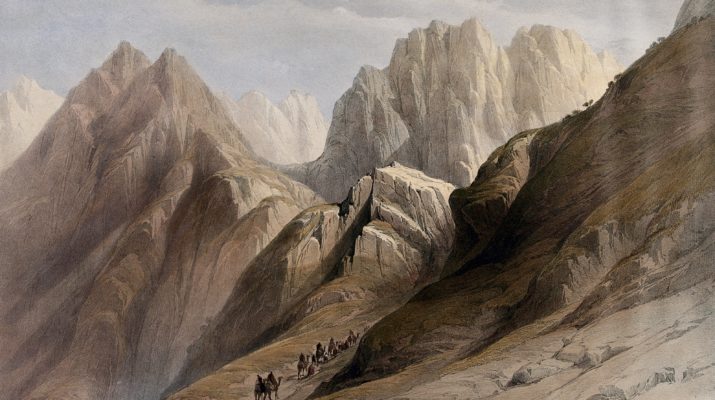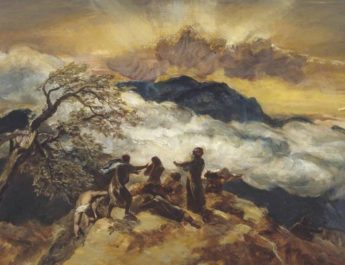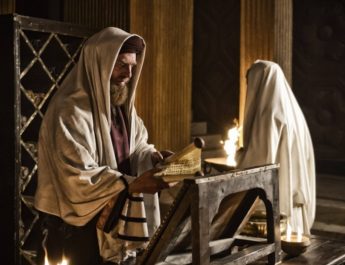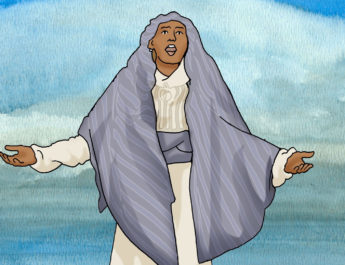Exodus 24
1 Then he said to Moses,A “Come upB to the Lord,C
A “Moses” = Mosheh. From mashah (to pull out in a literal or figurative sense, to draw out) OR from Egyptian mes or mesu (child, son i.e. child of…). This is Moses – the one drawn out from the water, which is to say, rescued. If derived from the Egyptian, his name would share a root with Rameses and Thutmose.
B “come up” = alah. This is to go up, approach, ascend, be high, be a priority; to arise in a literal or figurative sense.
C “Lord” = YHVH. From havah (to be, become) or hayah (to come to pass, become, be). This is the name of the God of Israel, the self-existent and eternal one, the tetragrammaton. This pronunciation has been lost to time so “Lord” is generally used in its place.
you and Aaron,D Nadab,E and Abihu,F
D “Aaron” = Aharon. Derivation uncertain. May mean “bearer of martyrs” OR be related to Ancient Egyptian ꜥḥꜣ rw (warrior lion) OR elevated, exalted, high mountain. This is Aaron. See https://en.wiktionary.org/wiki/Aaron
E “Nadab” = Nadab. From nadab (to offer voluntarily, incite, impel; to volunteer to be a soldier or offer freely). This is Nadab, a name meaning “liberal” or “willing” or “volunteer” or “generous” or “noble.” See https://www.abarim-publications.com/Meaning/Nadab.html
F “Abihu” = Abihu. 12x in OT. From ab (father in a literal or figurative sense – grandfather, chief, ancestor) + hu (third person pronoun – he, she, it). This is Abihu, a name meaning “he is father” or “worshipper of God.” See https://www.abarim-publications.com/Meaning/Abihu.html
and seventyG of the eldersH of Israel,I and worshipJ at a distance.K
G “seventy” = shibim. From sheba (seven – the number of perfection/sacred fullness). This is seventy.
H “elders” = zaqen. From the same as zaqan (beard or chin – the beard represents old age). This is old, aged, or elder.
I “Israel” = Yisrael. From sarah (to persist, exert oneself, contend, persevere, wrestle, prevail) + el (God or god). This is Israel, meaning God strives or one who strives with God; new name for Jacob and for his offspring. This refers to the people and to the land.
J “worship” = shachah. This is to bow down, make a humble entreaty, to do homage to royalty or to God.
K “at a distance” = rachoq. From rachaq (to widen, become distant, cast, or remove in a literal or figurative sense). This is distant or far, whether of space or of time.
2 Moses aloneL shall come nearM the Lord; but the others shall not come near, and the peopleN shall not come up with him.”
L “alone” = bad. From badad (to divide or be separated; alone, solitary, lonely, isolated, straggler). This is apart, alone, separation, body part, tree branch, except. It can also be a city’s chief.
M “come near” = nagash. This is to draw, bring, or come near. It is approaching for any reason – as an attack on an enemy, in order to worship, to make an argument. It can also be used as a euphemism for sex.
N “people” = am. From amam (to darken, hide, associate; creating shadows by huddling together). This is people or nation. It can be used specifically for a tribe, collectively of troops or armies, or figuratively to refer to a flock of animals.
3 Moses cameO and toldP the people allQ the wordsR of the Lord and all the ordinances;S
O “came” = bo. This is to enter, come in, advance, fulfill, bring offerings, enter to worship, attack. It can also have a sexual connotation.
P “told” = saphar. From sepher (writing, document, book, evidence). This is properly to tally or record something. It can be enumerate, recount, number, celebrate, or declare.
Q “all” = kol. From kalal (to complete). This is all or every.
R “words” = dabar. From dabar (to speak, declare, discuss). This is speech, a word, a matter, an affair, charge, command, message, promise, purpose, report, request. It is a word, which implies things that are spoken of in a wide sense.
S “ordinances” = mishpat. From shaphat (to judge, defend, pronounce judgment, condemn, govern). This is a verdict or formal sentence whether from humans or from God. It includes the act of judging as well as the place that judging takes place, the suit itself, and the penalty. Abstractly, this is justice, which includes the rights of the participants.
and all the people answeredT with oneU voice,V and said, “All the words that the Lord has spokenW we will do.”X
T “answered” = anah. This is answer, respond, announce, sing, shout, or testify. It means to pay attention, which implies responding and, by extension, starting to talk. Used in a specific sense for singing, shouting, testifying, etc.
U “one” = echad. Perhaps from achad (to unify, continue on a path; figuratively, to gather one’s thoughts). This is the number one, first, united. It can also be alone, altogether, a certain, a few.
V “voice” = qol. This is a sound, used often for human voices. Also used when God speaks or angels, animals or instruments. It can be a cry or a noise, thunder or earthquakes and so on.
W “spoken” = dabar. Related to “words” in v3. See note R above.
X “do” = asah. This is to make, do, act, appoint, become in many senses.
4 And Moses wroteY down all the words of the Lord. He rose earlyZ in the morning,AA and builtBB an altarCC at the footDD of the mountain,EE
Y “wrote” = kathab. This is to inscribe, write, record, or decree.
Z “rose early” = shakam. This is leaning one’s shoulder into a burden or load, whether a person or an animal. Thus, it meant starting or rising early.
AA “morning” = boqer. From baqar (to seek, plow, break forth, admire, care for). This refers to the break of day. So it is dawn, early, morning, or morrow.
BB “built” = banah. This is to build, make, set up, restore, repair, or obtain children. It is to build literally or figuratively.
CC “altar” = mizbeach. From zabach (to kill, slay, offer; slaughtering an animal to offer as a sacrifice). This is an altar.
DD “at the foot” = tachat. This is underneath, below, the bottom, instead of.
EE “mountain” = har. From harar (hill or mountain). This is mountain, hill, hilly region.
and set up twelveFF pillars,GG corresponding to the twelve tribesHH of Israel. 5 He sentII young menJJ of the peopleKK of Israel,
FF “twelve” = shenayim + asar. Shenayim is from sheni (double, again, another, second); from shanah (to fold, repeat, double, alter, or disguise). This is two, both, second, couple. Asar is from the same as eser (ten). This is ten or -teen.
GG “pillars” = matstsebah. From natsab (to station, appoint, establish, take a stand). This is literally something that is stationed. So, it could refer to a column, a stump, some kind of image or idol, or a garrison.
HH “tribes” = shebet. This is a rod, staff, club, scepter, dart, or tribe. Literally a stick that can be used for punishing, writing, fighting, walking, ruling; thus, used figuratively for a clan.
II “sent” = shalach. This is to send out, away, send for, forsake. It can also mean to divorce or set a slave free.
JJ “young men” = naar. May be from na’ar (to shake, toss up and down, tumble around). This is a child or a servant. It is a child in their active years so they could be aged anywhere from infancy to adolescence.
KK “people” = ben. Literally, “children of Israel.” Related to “built” in v4. From banah (see note BB above). This is son, age, child. It is son in a literal or figurative sense.
who offeredLL burnt offeringsMM and sacrificedNN oxenOO as offeringsPP of well-beingQQ to the Lord.
LL “offered” = alah. Same as “come up” in v1. See note B above.
MM “burnt offerings” = olah. Related to “come up” in v1. From alah (see note B above). This is a step, stairs, or some kind of ascent. It is also used for whole burnt offerings, being the offering in which the whole things is burned and rises as smoke. Burnt offerings were the least common of the offerings: most were eaten, shared with the priest and the one bringing the offering.
NN “sacrificed” = zabach. Related to “altar” in v4. See note CC above.
OO “oxen” = par. Perhaps related to parar (to break, defeat, frustrate, caste off, clean, cease). This is a young bull or ox.
PP “offerings” = zebach. Related to “altar” in v4 & “sacrificed” in v5. From zabach (see note CC above). This is a slaughter – literally of an animal. So, it implies the act or the animals used in sacrifice. Further, it can mean offering.
QQ “well-being” = shelem. From shalam (to make amends, finish, be safe, be friendly, to be complete or sound). This is a peace offering or a sacrifice of well-being. It was a voluntary offering given when one celebrated thanksgiving, alliance, or friendship.
6 Moses tookRR halfSS of the bloodTT and putUU it in basins,VV and half of the blood he dashedWW against the altar.
RR “took” = laqach. This is to take, accept, carry away, receive. It can also have the sense of take a wife or take in marriage.
SS “half” = chatsi. From chatsah (to halve, divide, reach, participate). This is half, middle, midnight, midst.
TT “blood” = dam. Perhaps from damam (to cease, be or become mute, silent, still, cut off, hold peace, be astonished, die). This is blood, bloodshed, bloodguilt, lifeblood, and death. It is used for people and animals. More often blood from a wound or the blood of the innocent. Used figuratively for violence or for wine. Closely tied to life and death.
UU “put” = sim. This is to put or place in a literal or figurative sense. It can be appoint, care, change, make, and may other things.
VV “basins” = aggan. 3x in OT. Perhaps from nagan (to strike a stringed instrument, to pluck or play it). This is a bowl, basin, or cup.
WW “dashed” = zaraq. This is to scatter or sprinkle, whether a liquid or a solid.
7 Then he took the bookXX of the covenant,YY and readZZ it in the hearingAAA of the people; and they said, “All that the Lord has spoken we will do, and we will be obedient.”BBB
XX “book” = sepher. Related to “told” in v3. See note P above.
YY “covenant” = berit. Perhaps from barah (to eat, choose, make clear); perhaps from bar (grain, wheat); from bara (to select, purify, cleanse, test, brighten, polish). This is a compact, covenant, alliance, treaty, or league.
ZZ “read” = qara. This is to call or call out – to call someone by name. Also used more broadly for calling forth.
AAA “hearing” = ozen. This is ear, hearing, audience, show. Properly, it is broadness – applied to its ear in reference to its shape.
BBB “be obedient” = shama. This is to hear, call, consent, or consider. It implies listening intelligently, giving attention, and, because of these two factors, obedience and action are often implied.
8 Moses took the blood and dashed it on the people, and said, “SeeCCC the blood of the covenant that the Lord has madeDDD with you in accordance with all these words.”
9 Then Moses and Aaron, Nadab, and Abihu, and seventy of the elders of Israel went up, 10 and they sawEEE the GodFFF of Israel. UnderGGG his feetHHH
CCC “see” = hinneh. From hen (lo! Behold! If, though; an expression of surprise). This is to draw attention, show suddenness or surprise, or to emphasize the importance of the coming statement. See! Lo! Behold!
DDD “made” = karat. This is to cut down, cut off, or make a covenant (idiom for making a covenant is “to cut a covenant”). It can also mean to destroy, fail, or consume.
EEE “saw” = raah. This is to see in a literal or figurative sense so stare, advise, think, view.
FFF “God” = Elohim. Related to “Israel” in v1. See note I above.
GGG “under” = tachat. Same as “at the foot” in v4. See note DD above.
HHH “feet” = regel. This is foot, endurance, or journey. It is a foot as the means of walking and so it implies a step or a greater journey. It can be used euphemistically for private parts.
there was somethingIII like a pavementJJJ of sapphire stone,KKK
III “something” = maaseh. Related to “do” in v3. From asah (see note X above). This is a word – any action whether positive or negative. It can also be a transaction, construction, activity, property, or something that is produced.
JJJ “pavement” = libnah. 1x in OT. From the same as lebenah (a brick, tile, or pavement; from root in the sense of the clay’s whiteness); from laban (to be or make white, to make bricks). This is paved or whiteness.
KKK “sapphire stone” = sappir. Related to “told” in v3 & “book” in v7. 11x in OT. Perhaps from Sanskrit sanipriya (“dark-colored stone – lit “dear to Saturn”) OR from saphar (to tally or record something; to enumerate, recount, number, celebrate, or declare); {from sepher (see note P above)}. This is a sapphire or lapis lazuli – a gem. See https://en.wiktionary.org/wiki/sapphire
like the veryLLL heavenMMM for clearness.NNN
LLL “very” = etsem. From atsam (vast, numerous, strong; to close one’s eyes, to make powerful; to break bones). This is self, life, strength, bone, or substance.
MMM “heaven” = shamayim. Root may mean being lofty. This is sky, the air, or heaven. It is in a dual noun form so this might refer to the part of the sky where the clouds move on the one hand and the part beyond that where the sun, moon, and stars are on the other hand.
NNN “clearness” = tohar. 2x in OT. From taher (bright, which implies being pure or clean; to purge, cleanse, or purify; clean in a ritual sense or a moral one (i.e. moral or holy)). This is clearness or brightness. It can also refer to ritual purity.
11 God did not layOOO his handPPP on the chief menQQQ of the peopleRRR of Israel; also they beheldSSS God, and they ateTTT and drank.UUU
OOO “lay” = shalach. Same as “sent” in v5. See note II above.
PPP “hand” = yad. This is hand, ability, power. Hand in a literal sense, but also what one can do or the means by which one does it.
QQQ “chief men” = atsil. 2x in OT. From the same as etsel (nearby, toward, joining); from atsal (to reserve, refuse, join, separate, keep). This is an extremity, side, or corner. It can also refer to a prominent person – a noble.
RRR “people” = ben. Same as “people” in v5. See note KK above.
SSS “beheld” = chazah. This is to gaze at – to see or behold. It can also refer to perceiving as a mental process or looking at something with pleasure. It can be used particularly to mean seeing a vision.
TTT “ate” = akal. This is to eat, devour, burn up, or otherwise consume. It can be eating in a literal or figurative sense.
UUU “drank” = shathah. This is to drink literally or figuratively. It could also be a drinker.
12 The Lord said to Moses, “Come up to me on the mountain, and wait there; and I will giveVVV you the tabletsWWW of stone,XXX with the lawYYY and the commandment,ZZZ which I have written for their instruction.”AAAA
VVV “give” = natan. This is to give, put, set, offer. It is to give literally or figuratively.
WWW “tablets” = luach. Root likely means glistening, so this would refer to a tablet as being polished in some sense, whether it’s made of stone, wood, or metal.
XXX “stone” = eben. This is a stone, weight, or mason. It is part of the word “Ebenezer.”
YYY “law” = torah. From yarah (to throw, shoot, be stunned; to flow as water so figuratively to instruct or teach). This is law, instruction, teaching, or statute. It can also refer to the first five books of the Bible – the Torah.
ZZZ “commandment” = mitsvah. From tsavah (to charge, command, order, enjoin). This is a commandment, law, ordinance obligation, or tradition. It is something commanded whether by God or by a human authority. This term is sometimes used collectively to refer to the Law.
AAAA “instruction” = yarah. Related to “law” in v12. See note YYY above.
13 So Moses set outBBBB with his assistantCCCC Joshua,DDDD and Moses went up into the mountain of God.
BBBB “set out” = qum. To arise, stand, accomplish, establish, abide. This is rising as in rising against, getting up after being sick or asleep, arising from one state to another, becoming powerful, or rising for action. It can also be standing in a figurative sense.
CCCC “assistant” = sharat. This is ministering, serving, or waiting on. It can refer to one offering service as a worshipper or one serving as a servant.
DDDD “Joshua” = Yehoshua. Related to “Lord” in v1 & “wait” in v12. From YHVH (see note C above) + yasha (to deliver, defend, help, preserve, rescue; properly, to be open, wide or free, which implies being safe. So, in a causative sense, this is to free someone). This is Joshua, Jeshua, or Yehoshua, which means “the Lord is salvation.”
14 To the elders he had said, “WaitEEEE here for us, until we come to you again;FFFF forGGGG Aaron and HurHHHH are with you; whoeverIIII has a disputeJJJJ may goKKKK to them.”
EEEE “wait” = yashab. This is to sit and so to remain and so to dwell. It is sitting for any reason – as a judge, in order to ambush, or just sitting quietly. Causatively, this can mean settling or marrying. This can also mean continue, endure, or establish.
FFFF “come…again” = shub. To turn back, return, turn away – literally or figuratively. Doesn’t necessarily imply going back to where you started from. This is also the root verb for the Hebrew word for repentance “teshubah.”
GGGG {untranslated} = hinneh. Same as “see” in v8. See note CCC above.
HHHH “Hur” = Chur. 15x in OT. From chavar (to be or become white or pale) OR from the same as chur (white things, white, white linen) OR from the same as chur (hole; a hole that was bored; a crevice where a snake lives; the cell of a prison). This is Hur or Chur, its meaning is uncertain.
IIII {untranslated} = baal. From baal (to marry, have dominion, be master). This is lord, owner, ally, master, or archer.
JJJJ “dispute” = dabar. Same as “words” in v3. See note R above.
KKKK “go” = nagash. Same as “come near” in v2. See note M above.
15 Then Moses went up on the mountain, and the cloudLLLL coveredMMMM the mountain. 16 The gloryNNNN of the Lord
LLLL “cloud” = anan. May be from anan (cover, cloud over; figuratively, acting in a secret way, practicing magic or soothsaying). This is a cloud as something that covers the sky.
MMMM “covered” = kasah. This is to cover, conceal, overwhelm. It is to cover as clothes do or to hide a secret.
NNNN “glory” = kabod. From kabad (to be heavy, weighty, burdensome). This is weighty. Figuratively, glorious, abundant, riches, honor, splendor – a reference to one’s reputation or character. This word is often used to describe God and God’s presence.
settledOOOO on MountPPPP Sinai,QQQQ
OOOO “settled” = shakan. This is to settle down in the sense of residing somewhere or staying there permanently. It can mean abide or continue. “Mishkan,” taken from this verb, is the Hebrew word for the Tabernacle (as a place where God abided).
PPPPP “Mount” = har. Same as “mountain” in v4. See note EE above.
QQQQ “Sinai” = Sinay. Probably from the same as Sin (Sin, a city meaning “clay” or “bush);{perhaps from asam (to gather, store) OR from seneh (thorn bush) OR related to Aramaic siyn (a god called Sin) OR perhaps Hebrew siyn (related to mud or clay)}. This is Sinai – a place whose name may mean “bush of the Lord” or “muddy.” See https://www.abarim-publications.com/Meaning/Sinai.html
and the cloud covered it for sixRRRR days;SSSS on the seventhTTTT day he calledUUUU to Moses out ofVVVV the cloud.
RRRR “six” = shesh. This is six. Figuratively, it can be a surplus since it is one more than the number of fingers on the hand.
SSSS “days” = yom. Root may mean being hot. This is the day in a literal or figurative sense. It can also mean birth, age, daylight, continually or other references to time.
TTTT “seventh” = shebii. Related to “seventy” in v1. From sheba (see note G above). This is seventh
UUUU “called” = qara. Same as “read” in v7. See note ZZ above.
VVVV “out of” = tavek. This is among, middle, in the midst, the center. Perhaps, properly, to sever.
17 Now the appearanceWWWW of the glory of the Lord was like a devouringXXXX fireYYYY on the topZZZZ of the mountain in the sightAAAAA of the peopleBBBBB of Israel.
WWWW “appearance” = mareh. Related to “saw” in v10. From raah (see note EEE above). This is sight, appearance, or vision. It can be a view, seeing itself, that which is seen, something real, or a vision one sees.
XXXX “devouring” = akal. Same as “ate” in v11. See note TTT above.
YYYY “fire” = esh. This is fire, burning, flaming, hot. It is fire in a literal or figurative sense.
ZZZZ “top” = rosh. This may come a word that means to shake. It is the head, captain, or chief. It can also be excellent or the forefront. It can be first in position or in statue or in time (i.e. the beginning).
AAAAA “sight” = ayin. This is eye in a literal or figurative sense so eye, appearance, favor, or a fountain (the eye of the landscape).
BBBBB “people” = ben. Same as “people” in v5. See note KK above.
18 Moses enteredCCCCC, DDDDD the cloud, and went up on the mountain. Moses was on the mountain for fortyEEEEE days and forty nights.FFFFF
CCCCC “entered” = bo. Same as “came” in v3. See note O above.
DDDDD {untranslated} = tavek. Same as “out of” in v16. See note VVVV above.
EEEEE “forty” = arbaim. From the same as arba (four); from raba (to make square or be four-sided); perhaps from raba (to lie down flat; can be to lie for mating). This is forty.
FFFFF “nights” = layil. Properly, this refers to light twisting away. It is used for night or midnight. Figuratively, this can mean adversity.
Image credit: “Ascent of the Lower Ranges of Mount Sinai” by Louis Haghe after David Roberts, 1849.




